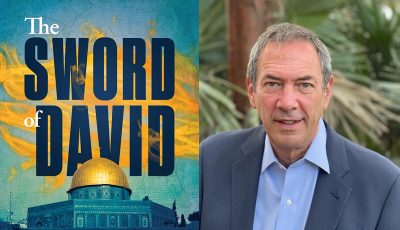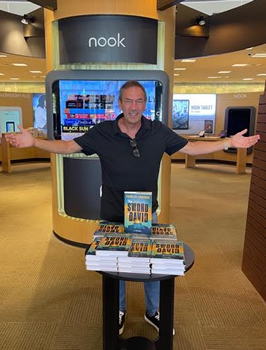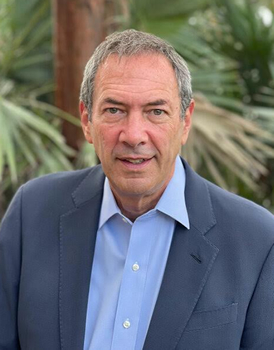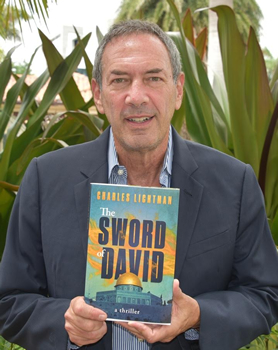

Up Close: Charles Lichtman
Stopping a Holy War
Besides being the author of THE SWORD OF DAVID, Charles Lichtman has a day job. A couple of them, actually. Trained as an attorney, he’s also an expert in Middle East affairs and issues regarding terrorism. He lives in South Florida, has twice been recognized as “Lawyer of the Year,” and founded a national voter protection program.
His latest novel, a fast-paced thriller set primarily in the Middle East, involves the search for the Ark of the Covenant and the original stone slab onto which God wrote the 10 Commandments, while trying to stop vicious terrorists dead set on a holy war against the West.
In this exclusive interview with The Big Thrill, Lichtman chronicles his journey to publication—including his earliest memories of wanting to be a writer.
Tell us a little about yourself, Chuck.
I was born and raised in Gary, Indiana, a blue-collar steel town in the mid-1960s and early ’70s. My father was a pharmacist and store manager for Walgreens, and my mother was a permanent substitute teacher assigned to my high school. I have a younger brother. Gary had everything going that would open up a young person’s eyes with impact: Vietnam War protests, race riots that burned out the city’s downtown, a murderous criminal enterprise drug war with drugs aplenty in the schools, and serious environmental concerns given that the city was located near Chicago on the Lake Michigan shore, being polluted by the steel mills.
I lived for playing and watching sports with my friends and reading about anything and everything. I was a leader, active in drama and student government, while also being a trailblazing editor-in-chief of the school newspaper. But at the same time, I was an undisciplined smartass to certain teachers, and I got suspended for fighting with my best friend in the school cafeteria that started a full-fledged, multi-hundred-person food fight.
What was possibly most formative was growing up with rampant anti-Semitism. I was punched or beat up at least 100 times until I learned enough self-defense. It took decades for me to come to grips with those events, which I know lurks in my personal psychology of writing THE SWORD OF DAVID.
Notwithstanding the difficult issues I had with the anti-Semites, I had many non-Jewish, Black, and Hispanic friends. I intuitively somehow figured out that it was better to get along with people and forge friendships than to isolate myself.
Where did you go to school and what did you study?
I attended Indiana University and had a double major in journalism and political science. By the time I graduated high school, I was fascinated by Watergate, and Woodward and Bernstein were my heroes. I also had a keen interest in reporting from war zones, like Ernie Pyle or Ernest Hemingway, especially if it was tied to events such as terrorism or the Middle East. In my senior year, The Chicago Tribune offered me a job. However, when my editor told me what the pay would be and that I’d be starting out covering things like the PTA, I decided to go to law school instead. My legal career worked out great, but everyone that has known me since college has heard me say I wish I had taken the job with the Tribune.
Tell us something about your legal career.

Lichtman at his “home” Barnes & Noble in Boca Raton, where they’d devoted an entire table to his new release
My first day of work as a lawyer, I was assigned a bankruptcy case involving a chain of movie theatres that owed its food and drink lender/concessionaire about $1 million. Using the investigative reporting skills I learned in journalism school, I started digging into the case. I discovered the Rabiela brothers who owned the theatres defrauded my client, had bribed Chicago officials on a real estate transaction, and that they were apparently the largest importers of brown Mexican heroin into the United States. I was super-aggressive dealing with them to the point where one day in court, I was told, verbatim, “If you don’t back off on this case, your body is going to end up in the trunk of a car.” I replied, “F— you,” and then walked straight into the bankruptcy judge’s office. He ushered me into the US Attorney’s office, where they interviewed me and told me not to worry about it. The next day the FBI raided the Rabielas’ offices, where they found a pallet of heroin, millions of dollars of cash wrapped in cellophane, and hundreds of weapons, including an RPG and machine guns. The Rabielas disappeared, and to my best knowledge were never found. By then, I was hooked on fighting with bad guys. This led to developing an expertise in handling large fraud cases including securities and corporate litigation. I assume I did something right, because I had eight different bad guys threaten my life, but twice was named Lawyer of the Year by the rating guide Best Lawyers in America.
You’re considered an expert in terrorism—how and why did this expertise develop?
Three personal situations influenced my life so significantly that when I was 17, I started intensively studying about Israel, terrorism, and Middle East affairs, and I’ve never stopped that research and analysis.
First, I grew up facing rampant anti-Semitism in Gary. Second, for as far back as I can remember, my parents and grandparents talked about how approximately 500 members from both sides of my family from Muncatch, Hungary (now Munkachevo, Ukraine) were put on boxcars by the Nazis and exterminated in Auschwitz. Only one uncle from my entire family survived the concentration camp, Oskar Klein. His life story is effectively the story of the book Exodus by Leon Uris, including coming from Crete to Palestine on a boat very similar to the Exodus. He went on to fight the Arabs when Israel was declared a state in 1948.
Third, in the summer of 1972, my family was told that Uncle Oskar was going to participate in the Munich Olympics with Israel as a boxing or wrestling coach. When the Black September terrorist organization broke into the Olympic Village and kidnapped the Israeli athletes, my family thought that the terrorists had captured Oskar, and it wasn’t until the names of those killed were revealed that we knew he was safe. As an aside, we learned later that Oskar never made it to Munich.
The combination of the anti-Semitism and the Munich Olympics attack changed my life. I immediately started researching and studying Middle East affairs, everything about Israel, terrorism, and the intelligence services. I began clipping, reading, and saving in detailed organized files significant material on those topics, while simultaneously building a corresponding related book library. This has been continuously a daily activity since 1972, or put differently, for the past 49 years.
An example of my understanding the terrorist mentality is established by my first novel, The Last Inauguration, where my lead antagonist character was the real-life Carlos. As I was close to finishing that novel, Carlos was finally arrested after committing, at that time, the most notorious terrorist acts ever. I located and contacted his lawyer in Paris, and after discussion with Carlos through the lawyer, Carlos agreed to grant me his first interview ever—but not until he read my novel. After doing so, Carlos handwrote me a letter from LaSante Prison and wrote, “I have just finished reading The Last Inauguration, and I must admit that although I am depicted as a rogue mercenary mass murderer, I did have a few good laughs seeing myself in the most unseemly situations, some of which could have happened in real life.” Doesn’t that say it all? Parenthetically, the interview was stopped by the French Minister of Justice, who obtained an injunction prohibiting the interview on the basis of “state secrets.”
The principal writing and editing of THE SWORD OF DAVID was completed in 2019. At that time, ISIS was broke and had been removed from Syria and Iraq. Most news reports concluded that al-Qaeda was practically out of the terrorism business. In chapters towards the end of my novel I wrote the opposite, based on my personal research, which was that ISIS was defeated in the Middle East but had re-established itself in Africa, starting with an extensive violence-driven public relations campaign on the internet, which has proven to be true. Further, I write that al-Qaeda has been rebuilding its organization and is again powerful and well-funded, spreading its wings through Europe and Africa. I wrote and believe that ultimately ISIS and al-Qaeda will merge, and that the fall of Afghanistan to the Taliban could serve as the impetus for that to occur, assuming the two groups’ leadership can figure out how to share power.
Where did the idea for THE SWORD OF DAVID come from?
The more I learned about the history of the Jewish people and Israel, combined with understanding the basic tenets of Islam and Christianity as well, made me convinced that while it’s presently unrealistic, if the issue of the Islamic fundamentalists could be resolved, anything could be possible. While essentially I am pragmatic in my day-to-day life, emotionally I’m an optimist that change could happen to make this world a better place to live.
Tell us how you researched the book.
First, I travelled to Israel five times to scout out every location possible, and in doing so, I photographed everything of interest from every angle possible, so I wouldn’t have to rely on skimpy notes or my memory. I made a special point to spend time and talk to what seemed to be ordinary Palestinians in East Jerusalem, the Arab Quarter of the Old City, Ramallah, and Hebron to assure I understood their mindset. I’m convinced that most Palestinians want peace and really wish for their children to have opportunity. I also had a friend who arranged for me to go inside the Temple Mount and see places the public never sees. That helped me visualize a critical scene inside that location early in the book, where the protagonist of my story, Chaim Klein, was having a very difficult moment. I also visited London, Paris, Rome, and Istanbul, and went through the same exercise there.
I spend a lot of time conducting internet research. I buy books if I think they’ll help me get the facts right, such as the eight I purchased on the Knights Templar, who play a role in THE SWORD OF DAVID. Maybe most relevant is that I read extensively about the Oslo Accords. Following that, I tracked down one of the Israeli negotiators involved in that process and spoke to him about the concepts in my book.
You mix in real characters and fictional ones, but in terms of the fictional characters, are any of them based on real-life people? If so, who?
Only two characters in THE SWORD OF DAVID are based on real-life people. Hassan Tamimi, the imam who gets involved in the Muslims for Peace program, is based on Hassen Chalghoumi, an imam in a mosque in Drancy outside Paris. He is very brave and outspoken in terms of challenging the Islamic fundamentalists and establishing relations with the Jewish people. My friend, Baroness Jill Knight of Collingtree, formerly a member of Parliament, was the inspiration for Baroness Collins. To my best knowledge, she is not nor has ever been the Grand Master of the Knights Templar. But she is an amazing, wonderful, and colorful person in every respect, and within the character, I think I captured Jill’s style, personality, and even her speaking cadence.
What’s next?
I have many pages of notes for a sequel to THE SWORD OF DAVID, but I’m not ready to start writing. As to my prior novels, when I least expected it, I literally had an epiphany as to the ending, and then, I started my outline and writing. Equally important, though, I’m spending a lot of time on marketing THE SWORD OF DAVID, so I don’t think I can start writing until things slow down a bit. However, I still have not ruled out trying to write the Exodus sequel.
- Tom Baragwanath - February 22, 2024
- Jess Lourey - September 21, 2023
- Reed Farrel Coleman - July 7, 2023




